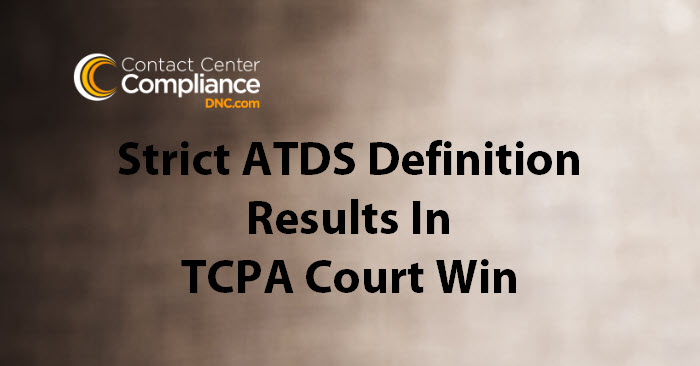In Marshall v. The CBE Group, Inc. the plaintiff filed a TCPA lawsuit alleging that The CBE Group (CBE) had called her using an ATDS. Citing the recent ACA v. FCC decision and stating that it would apply a strict definition of an ATDS, the court held that CBE’s, “communications infrastructure does not constitute an ATDS.”
On March 30, 2018, the District of Nevada granted summary judgment on a TCPA claim in favor of The CBE Group, a debt collections company. The court found that CBE’s Manual Clicker Application (MCA) is not an automatic telephone dialing system (ATDS).
The Facts
The plaintiff in this case, Gretta Marshall, had fallen behind on her DirecTV bill payments. DirecTV referred the consumer’s account to CBE for collection. After obtaining Ms. Marshall’s cellphone number using their resources, CBE began calling.
Over a six month period, CBE placed 189 calls using their proprietary MCA to dial. Ms. Marshall alleged that during that period she received two calls per day which continued even after her request for them to stop. Additional calls were also made by CBE to her employer.
Ms. Marshall filed her complaint against CBE alleging that they violated the TCPA by using an ATDS to place calls to her cellphone without consent. Additional charges included violations of the Fair Debt Collection Practices Act and the Nevada Deceptive Trade Practices Act.
The MCA Dialing Application
At issue in this lawsuit was whether the MCA application is an ATDS. To answer that question we must first understand how the CBE application works.
To place calls, CBE uses their Manual Clicker Application (MCA) which requires that a CBE agent manually initiate calls by clicking a bull’s-eye on a computer screen. After that action occurs, the call is then passed through LiveVox’s cloud which connects a CBE agent with the intended recipient of the call.
The Court Decision
In making a decision, the court relied on the recent D.C. Circuit Court of Appeals’ decision in ACA International v. FCC’s. They focused specifically on the strict definition of an ATDS. In the ACA International ruling the court rejected the Federal Communications Commission’s (FCC) expansive interpretation of devices which qualify as an ATDS.
Based on the facts of this case, the court found that the dialing application used by CBE is not an ATDS and that CBE has no TCPA liability. The court ruled that Ms. Marshall failed to present sufficient evidence that the MCA application can place calls on its own without human intervention.
After the court’s ruling, Ms. Marshall’s legal representation tried to argue that the court is not required to follow the ACA International decision. The district court explained:
“The D.C. Circuit’s decision is binding on this Court because appellate courts
have exclusive jurisdiction to determine the validity of all FCC final orders
and the Judicial Panel on Multidistrict Litigation has consolidated
the various appeals in that case in the D.C. Circuit.”
On the TCPA issue, the court granted summary judgment in favor of CBE.
Comments
Ultimately, the court agreed that, in fact, CBE did not use an ATDS to place calls to Ms. Marshall’s cellphone. The plaintiff failed to show that CBE’s Manual Clicker Application was an ATDS on two fronts:
- She failed to show that the application could dial without call-by-call human intervention.
- She failed to show that the application had the capacity to store or produce numbers that could be called using a random or sequential number generator.
This court ruling is one of the first major post-ACA International v. FCC decisions. Prior to this decision, the debt collection industry erred on the side of caution when calling consumers. They purposefully avoided any potential TCPA liability after the FCC had issued its earlier expansive definition of an ATDS.
The D.C. Circuits decision in ACA International changed that view when it simplified for the courts the definition of what constitutes an ATDS by removing the issue of “potential capacity”. Going forward, the courts can focus on the merits of a lawsuit’s allegations of harm and provide clear rational decisions. For debt collectors, this means more freedom in their pursuit to collect on debts and less risk of lawsuits alleging TCPA violations based on the method of dialing.
